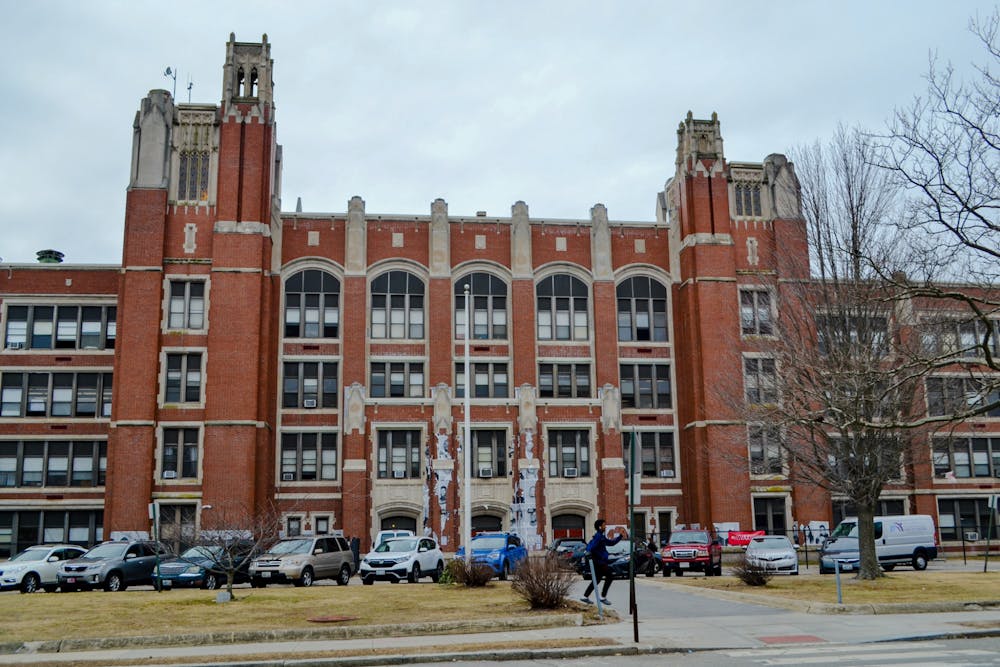The anticipated completion date for goals set after the 2019 state takeover of the Providence Public School District, which include meeting specific test score thresholds and attendance levels in the district, has been pushed by two years until the 2026-27 school year, R.I. Education Commissioner Angélica Infante-Green told the Senate Oversight Committee during a March 1 hearing.
The district initially planned to meet its stated goals, which were first laid out in the state’s 2020 Turnaround Action Plan, in the 2024-25 school year, Infante-Green said at the hearing.
Academic disruption from the COVID-19 pandemic is what caused the timeline adjustment, Victor Morente, director of communications for the Rhode Island Department of Education, wrote in an email to The Herald.
Sen. Louis DiPalma MSc’89 P’08, a democrat who is the chairman of the Senate Oversight Committee, told The Herald that many of the goals identified in the turnaround plan are not realistic, even with the two years of additional time.
For instance, the state aims for eighth-grade mathematics scores, which were in the fifth percentile nationally last year, to be in the 50th percentile by 2027, according to the Providence Journal. DiPalma said that he does not believe this goal is attainable.
“My personal opinion is that (there are) too many goals,” he said, adding that some are “extremely aspirational.” If the district does not meet the goals set in the turnaround plan, DiPalma said he believes that the state would need a recovery plan to determine how to move forward.
“It’s not clear … what is the exit strategy of the state,” DiPalma said. “Even without the two-year change, it was unclear when the state was expecting to return the district back to city” control.
DiPalma added that there has been limited discussion regarding when the state’s takeover would end. He said he remains skeptical of whether continued oversight from RIDE is beneficial for the district.
“It wasn’t meant to just go five years,” Infante-Green told WPRI, referring to the state takeover. “It was five years and then we would reevaluate. We want to make sure that everything we’re putting in place takes hold.” The state currently has control of Providence schools until 2025.
The pandemic “has had a serious impact on students’ learning across the country,” Nicholas Domings, PPSD chief communications officer, wrote in an email to The Herald. “PPSD and RIDE have a new baseline and we must consider that in the Providence turnaround,” he added.
DiPalma said that “the jury is still out” on whether the takeover has been successful so far. But he stressed that the takeover is not a partisan issue. A lack of education means slower economic growth for Providence and, more broadly, the state, he added. “As Providence goes, so goes the rest of the state.”
“We’ve let the students down for decades,” DiPalma said. The Turnaround Action Plan is an opportunity to change the paradigm, he added.
Teachers are “the front line to making progress,” DiPalma said, adding that having a teacher in every classroom is “paramount” as one of the turnaround plan’s goals. The continuing teacher shortage will hurt the district no matter what happens with the turnaround, he said.
One goal in the turnaround plan is for 95% of classrooms to have a permanent teacher, but DiPalma said 100% is needed to provide a suitable education for Providence youth.
Domings previously told The Herald that because of an increase in teacher vacancies at PPSD this year, the district has increased retention and recruiting efforts, including earlier job postings, sign-on bonuses and loan forgiveness.
Continued oversight from the state has drawn mixed reactions from the teachers’ union.
Maribeth Calabro, president of the Providence Teachers’ Union, said the takeover has not been beneficial to teachers or students. “Not much has changed,” she said.
Domings wrote that the district has made notable progress in the two years since the takeover, such as “being one of the first major districts to return to in-classroom learning,” adopting “gold standard core K-12 curricula” and making sure “students are supported with the addition of school guidance counselors at every elementary school and new community specialists at every secondary school.”
Other completed initiatives include ensuring every school has an assistant principal, adding math and literacy coaches at all high schools, adding four days of professional development for teachers and creating a dual-language middle school and career and technical education pathways, Domings said.
“It’s critical that we get this right. We cannot get this wrong, and we cannot do this fast enough,” DiPalma said. “The (22,000) students, their parents and the million people in Rhode Island are counting on (improvement in the district) to happen now.”





